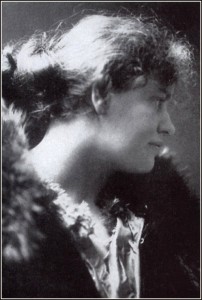Today we pay tribute to the Russian philosopher, author and first female psychoanalyst, Lou Andreas-Salomé – whose “importance to the history of the development of women is immeasurable,” according to none other than Anaïs Nin. Indeed, while most turn-of-the-century revolutionary women were fighting for their freedom by demanding lawful rights, Lou Andreas-Salomé lived her life as if no one had ever told her that a woman didn’t already have those rights! She studied philosophy and theology – lofty subjects at the time reserved only for men. She supported herself as a writer, penning more than twenty books including rigorous volumes of philosophy, psychology and literary criticism. She refused to surrender her surname when she married, and would go on to enjoy a string of uncommon arrangements with men – deciding herself when these relationships had run their course. And, in this age of intense disillusion and questioning – as Europe’s elite minds strove to replace an absent God with a new morality – Lou Andreas-Salomé demanded that her own formidable intellect should be part of that discourse. She formed intense cerebral relationships with three of the era’s most illustrious men – Friedrich Nietzsche, Rainer Maria Rilke and Sigmund Freud – the former two falling madly in love with her. What woman before had so brilliantly invaded the intellectual domains of men, or stepped out of the confines of her gender with such unruly determination? It is therefore little wonder that the writer Barbara Kraft has called Lou Andreas-Salomé “the first modern woman.”
Louise von Salomé was born in 1861, the privileged daughter of a general. Raised in the mysticism of the Russian Orthodox Church and immersed in expectations, this extremely pious young girl fully expected that her God would readily appear before her. But when she beseeched Him, his failure to materialise pitched Lou into a life-long theological crisis. Henceforth, she would come to reject all higher authority and answer only to herself. Refusing also to bow to the conventional expectations of her high station, Lou demanded instead the right to further education and was accepted at the esteemed University of Zurich. Throwing herself into her studies with characteristic intensity, she fell ill and was sent to Rome to recuperate. It was there at the age of twenty-one that she met philosophers Paul Rée and Friedrich Nietzsche. The three became inseparable and planned, outrageously, to live together in a utopian commune-cum-think-tank. But, when both men fell desperately in love with the beautiful and bewitching Lou, Nietzsche’s sister Elizabeth created such a social stink that Lou’s association with Nietzsche himself ended bitterly and in scandal. Their intense exchange of ideas and emotions, however, bore magnificent fruit: just nine months after their meeting, he began to write Thus Spoke Zarathustra. Nietzsche acknowledged Lou as the inspiration for what would become one of his most celebrated works, and said of her: “I found no more gifted or reflective spirit… Lou is by far the smartest person I ever knew.”
Feeling scandalised across Europe, at aged twenty-five, von Salomé – in order to live independently – married philologist Friedrich Carl Andreas. Still a virgin, however, she refused to consummate their relationship despite remaining married to Andreas until his death in 1930. After nine years of self-serving relationships, the thirty-four year old Lou finally encountered the young Austrian poet with whom she would have her life’s most passionate relationship. Changing his name from René at Lou’s behest, the young Rainer Maria Rilke, through Lou’s nurturing, rose from promise to genius and worldwide fame as one of the most celebrated German-language poets. Their love affair lasted four explosive years, but they would remain lifelong allies.
It was in 1911 that Lou concluded her lifelong quest for an alternative to religion when she met Sigmund Freud, whilst attending the Weimar Congress of the International Psychoanalytical Association. She and Freud embarked upon a vigorous exchange of ideas in a correspondence that would last two decades; Freud’s encouragement causing Lou to become the first female psychoanalyst. Moreover, when Lou died at the age of seventy-five in the German university town of Göttingen, so associated with Freud had she become that the Gestapo raided her house and confiscated her entire library.
Lou Andreas-Salomé died on this day in 1937. In her life, she bridged the worlds of philosophy, literature and psychology – making her own contributions to each, and influencing their respective most distinguished and radical proponents. Her rebellion was verily as essential to the liberation of women as that of any social revolutionary.



10 Responses to 5th January 1937 – Lou Andreas-Salome: The First Modern Woman